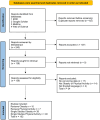Peer Intervention in Obesity and Physical Activity: Effectiveness and Implementation
- PMID: 40175646
- PMCID: PMC11965182
- DOI: 10.1007/s13679-025-00625-z
Peer Intervention in Obesity and Physical Activity: Effectiveness and Implementation
Abstract
Purpose of review: This paper reports the effectiveness of peer intervention in physical activity and obesity, with a focus on implementation. Peer intervention is a parallel method to traditional professional clinical processes, often targeting hard to reach populations. It includes peer education, peer counseling and peer support.
Recent findings: There were ten reviews on Physical Activity and seven on Obesity. Six reviews on obesity had mainly positive results; one on obesity in mental health was more negative. About two-thirds of reviews of Physical Activity interventions had positive outcomes. The overall effect was moderate. There were 39 single studies on Obesity and 46 on Physical Activity. 36% of Obesity studies and 13% of Physical Activity studies were from developing countries. Three single studies from developing countries and three from developed countries were elaborated. The extensively described implementation program was from a developed country. Discussion of limitations and strengths led to recommendations for implementation and evaluation. Overall, peer intervention in both obesity and physical activity showed quite strong evidence of effectiveness. Had all studies followed the implementation/evaluation recommendations, the strength of evidence might have been better. Future research should focus on cost-effectiveness and long-term follow-up.
Keywords: Developing countries; Implementation; Peer counseling; Peer education; Peer intervention; Peer support.
© 2025. The Author(s).
Conflict of interest statement
Declarations. Ethical Approval: This research study was conducted retrospectively from data already published and no ethics approval or participant consent were required. Competing Interests: The authors declare no competing interests.
Figures
References
-
- World Health Organization (WHO). (2024). Obesity and overweight. https://www.who.int/news-room/fact-sheets/detail/obesity-and-overweight/ Accessed September 1, 2024.
-
- Topping KJ. Peer interventions for health and wellbeing. Boca Raton, FL: CRC Press.; 2025. 10.1201/9781003438366. https://www.routledge.com/9781032572109.
-
- Campos DG, Fütterer T, Gfrörer T, Lavelle-Hill R, Murayama K, König L et al. Screening smarter, not harder: A comparative analysis of machine learning screening algorithms and heuristic stopping criteria for systematic reviews in educational research. Educ Psychol Rev 2024; 36(1), 19. 10.1007/s10648-024-09862-5.
-
- Nickols-Richardson SM, Nelson SA, Corbin MA. Peer nutrition education in childhood and adolescence: Evidence-based guidance for impactful programs. J Nutr Educ Behav. 2014;46(4):S196. 10.1016/j.jneb.2014.04.211.
Publication types
MeSH terms
LinkOut - more resources
Full Text Sources
Medical
Research Materials


